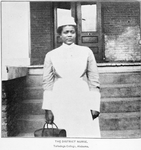Menopause, Rurality, And Obesity in Rural African American Women
View
@ Florida International Unviersity
kilgore, colleen
Description
In the US, one in every eight deaths is due to an obesity-related chronic health condition (ORCHC). More than half of African American women (AAW) 20 years old or older are obese or morbidly obese, as are 63% of menopausal AAW. Many have ORCHC that increase their morbidity and mortality and increase health care costs. In 2013, 42.6 percent of AAs living in South Carolina (SC) were obese. The purpose of this cross-sectional study was to identify the cognitive, behavioral, biological, and demographic factors that influence health outcomes (BMI, and ORCHC) of AAW living in rural SC. A sample of 200 AAW (50 in each of the 4 groups of rurality by menopausal status), 18-64 years, completed the: Menopausal Rating Scale (symptoms)Body Image Assessment for Obesity (self-perception of body)Mental Health InventoryBlock Food Frequency QuestionnaireEating Behaviors and Chronic Conditions, Traditional Food Habits, and Food Preparation Technique questionnaires – and measures for Body Mass Index. Most rural, and premenopausal AAW were single and not living with a partner. Premenopausal women had significantly higher educational levels. Sixty percent of AAW had between 1 and 5 ORCHC. Most AAW used salt based seasonings, ate deep fried foods 1 to 3 times a week, and ate outside the home 1 to 3 times a month. Few AAW knew the correct daily serving for grains and dairy, and most consumed less than the recommended daily serving of fruits, vegetables and dairy. Morbidly obese AAW used more traditional food preparation techniques than obese and normal-weight AAW. Rural,...
JoAnne YoungblutDorothy BrootenLuz PorterMarcia Magnus




![Public documents [1919] Public documents [1919]](https://d2l9jrtx1kk04i.cloudfront.net/eb41d65bfd520ed5e81813272bdef868c0dc6512.png)




![Mirandy on the [theft of husbands] Mirandy on the [theft of husbands]](https://d2l9jrtx1kk04i.cloudfront.net/bb1dcdb480c4e586a039db359cc6278c4d0e774f.png)
![Executive and legislative documents of the State of North Carolina [1885] Executive and legislative documents of the State of North Carolina [1885]](https://d2l9jrtx1kk04i.cloudfront.net/bc4e6cdc5679ee72670278e097c6e24db22e78a8.png)
![Public documents [1917] Public documents [1917]](https://d2l9jrtx1kk04i.cloudfront.net/7797f407af355dccb1f74a667b4598bc33024173.png)
![Public documents of the State of North Carolina [1901 v.2] Public documents of the State of North Carolina [1901 v.2]](https://d2l9jrtx1kk04i.cloudfront.net/253308c2dc4198649e0759cebab1921da721c331.png)
![Public documents of the State of North Carolina [1905 v.2] Public documents of the State of North Carolina [1905 v.2]](https://d2l9jrtx1kk04i.cloudfront.net/bf473a823fd9ddcf46f951e4a6cb45608d7279c6.png)
![Public documents of the General Assembly of North Carolina [1879] Public documents of the General Assembly of North Carolina [1879]](https://d2l9jrtx1kk04i.cloudfront.net/f28f04fc7c5b30f1b7984df085a532d790049329.png)
![Public documents of the State of North Carolina [1903 v.2] Public documents of the State of North Carolina [1903 v.2]](https://d2l9jrtx1kk04i.cloudfront.net/4328e26dc948076110dc509784f6c5dbf4fb197b.png)
![Public documents of the State of North Carolina [1907 v.2] Public documents of the State of North Carolina [1907 v.2]](https://d2l9jrtx1kk04i.cloudfront.net/56540210e3ac0eb1cb6fe81d0a6d587a740db83f.png)




